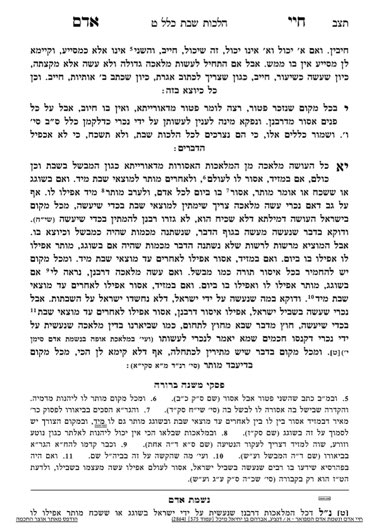Sponsorships for the upcoming Klalim, which discuss the 39 melachos of Shabbos, are available. Please contact Rabbi Reingold for more information at rabbireingold@gmail.com or 301.996.5910
We are continuing in siman 11, discussing the concept of maaseh Shabbos. We have finished the Klal, and have a few other points to clarify.
We left off discussing people who are mechalel Shabbos for business purposes, and how one may not purchase items which were made on Shabbos from their stores. On the other end, we need to clarify the halacha of a tinok shenishba and whether it makes a difference to this halacha.
Tinok shenishba is a concept the Gemara discusses at the beginning of the 7th perek of Shabbos. It refers to a young child who was physically captured by non-Jews and subsequently raised among them. As the child has no concept of Shabbos, the actions he is performing even as an adult are considered actions of an oneiss. The Gemara cannot contemplate a Jewish child being brought among Jews who would not have basic Jewish knowledge, and therefore assumes the only case to which this concept is relevant is a child who literally was raised by non-Jews. Sadly, nowadays many Jews are unaware or unaffiliated and know nothing about Torah and are the equivalent of a tinok shenishba. The argument of many poskim is that since they do not know better, the work they are intentionally performing on Shabbos is not for the purpose of chilul Shabbos inasmuch as it is work which is being done on a Shabbos. In other words, they have no intention to desecrate Shabbos, just to do what they are used to doing on a Saturday. Thus, at worse they are considered a shogeig, and, as we have learned, it will be muttar to benefit from the melacha after Shabbos.
Arguably, it could be possible that their work is considered misaseik. One explanation of the concept of misaseik is that one has no way of knowing anything otherwise, as opposed to shogeig or meizid where one should have known and did not. Thus, it would not be assur to buy from such a person, because it is either a shogeig or possibly even lighter.
As a shogeig, it is mutar to others immediately and to the offender after Shabbos. The Gra holds that in a case of pressing need, it will be muttar on Shabbos even to the offender himself.
We know there is a concept of bichdei Sheyaasu and waiting after Shabbos until after the time it would have taken to perform the melacha after Shabbos. In Eretz Yisroel, if a person arranged before Shabbos that a taxi driver should be available the moment Shabbos is over, it is a problem of bichdei sheyaasu. This is true whether the driver is Jewish or not. If the taxi is driving around, and did not perform the melacha explicitly for a specific person, one may benefit from it.
The Biur Halacha asks that we know the halacha is if one plants on Shabbos, they must uproot the entire plant. The Biur Halacha explains that melacha performed on Shabbos which one refrains from using produces a statement that a Jew cannot benefit from something produced on Shabbos. However, in something which only becomes relevant in the future, such as once the seed disintegrates and regrows, the benefit of the melacha does not surface immediately. There is no way to demonstrate that one is not benefitting from chilul Shabbos, by refraining to use it, so they have no choice but to uproot it.. Thus, one must uproot the plant even if it was planted b’shogeig, both for the planter themselves and for others. They may replant it afterwards.
Summary
- The maaseh Shabbos of a Jew who is mechalel Shabbos is treated like the maaseh Shabbos of a non-Jew. However, if the person was a tinok shenishba, one can treat the maaseh Shabbos as maaseh Shabbos performed b’shogeig, and possibly even as misaseik.
- If a Jew who is mechalel Shabbos performs melacha before the end of Shabbos for a specific Jew, one must wait bichdei sheyaasu before benefitting. However, if the melacha was performed and there was no one specific in mind, one can be meikil.
- Even when maaseh Shabbos was performed b’shogeig, if there is no way to tell that one is refraining from benefit from the melacha, the maaseh Shabbos must be removed.
- They may replant it afterwards. We will discuss how this applies to other melachos.



